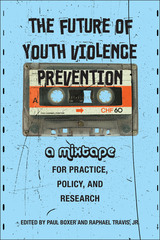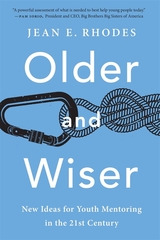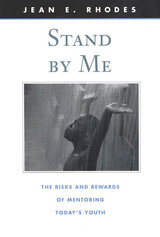

Youth mentoring programs must change in order to become truly effective. The world’s leading expert shows how.
Youth mentoring is among the most popular forms of volunteering in the world. But does it work? Does mentoring actually help young people succeed? In Older and Wiser, mentoring expert Jean Rhodes draws on more than thirty years of empirical research to survey the state of the field. Her conclusion is sobering: there is little evidence that most programs—even renowned, trusted, and long-established ones—are effective. But there is also much reason for hope.
Mentoring programs, Rhodes writes, do not focus on what young people need. Organizations typically prioritize building emotional bonds between mentors and mentees. But research makes clear that effective programs emphasize the development of specific social, emotional, and intellectual skills. Most mentoring programs are poorly suited to this effort because they rely overwhelmingly on volunteers, who rarely have the training necessary to teach these skills to young people. Moreover, the one-size-fits-all models of major mentoring organizations struggle to deal with the diverse backgrounds of mentees, the psychological effects of poverty on children, and increasingly hard limits to upward mobility in an unequal world.
Rhodes doesn’t think we should give up on mentoring—far from it. She shows that evidence-based approaches can in fact create meaningful change in young people’s lives. She also recommends encouraging “organic” mentorship opportunities—in schools, youth sports leagues, and community organizations.

Winner of the Eleanor Maccoby Book Award
“This engaging and well-written book is a significant advance in our understanding of when and how mentoring matters…[It] lays the foundations for an approach to mentoring that is both rigorous and rich in new ideas.”
—Robert D. Putnam, author of Our Kids: The American Dream in Crisis
“Rhodes forces us to slam the brakes on ineffective practices and improve an industry that is devoted to the potential of our nation’s children…The author’s concrete recommendations will create new pathways to opportunity for youth in greatest need.”
—Michael D. Smith, Executive Director, My Brother’s Keeper Alliance
“A powerful assessment of what is needed to best help young people today.”
—Pam Iorio, President and CEO, Big Brothers Big Sisters of America
Youth mentoring is one of the most popular forms of volunteering in the world today, but does it work? Drawing on over thirty years of research and her own experience in the field, Jean Rhodes reveals that most mentoring programs fail to deliver what young people actually need. Many prioritize building emotional bonds between mentors and mentees. But research shows that effective programs go far beyond this, developing specific social, emotional, and intellectual skills.
Most mentoring programs rely on volunteers, who rarely have the training to teach these skills. Their one-size-fits-all models struggle to meet the diverse needs of mentees, and rarely take account of the psychological effects of poverty on children. Rhodes doesn’t think we should give up on mentoring—far from it. Instead, she recommends “organic” mentorship opportunities—in schools, youth sports leagues, and community organizations—and shares specific approaches that can spark meaningful change in young people’s lives.

A child at loose ends needs help, and someone steps in--a Big Brother, a Big Sister, a mentor from the growing ranks of volunteers offering their time and guidance to more than two million American adolescents. Does it help? How effective are mentoring programs, and how do they work? Are there pitfalls, and if so, what are they? Such questions, ever more pressing as youth mentoring initiatives expand their reach at a breakneck pace, have occupied Jean Rhodes for more than a decade. In this provocative, thoroughly researched, and lucidly written book, Rhodes offers readers the benefit of the latest findings in this burgeoning field, including those from her own extensive, groundbreaking studies.
Outlining a model of youth mentoring that will prove invaluable to the many administrators, caseworkers, volunteers, and researchers who seek reliable information and practical guidance, Stand by Me describes the extraordinary potential that exists in such relationships, and discloses the ways in which nonparent adults are uniquely positioned to encourage adolescent development. Yet the book also exposes a rarely acknowledged risk: unsuccessful mentoring relationships--always a danger when, in a rush to form matches, mentors are dispatched with more enthusiasm than understanding and preparation--can actually harm at-risk youth. Vulnerable children, Rhodes demonstrates, are better left alone than paired with mentors who cannot hold up their end of the relationships.
Drawing on work in the fields of psychology and personal relations, Rhodes provides concrete suggestions for improving mentoring programs and creating effective, enduring mentoring relationships with youth.
READERS
Browse our collection.
PUBLISHERS
See BiblioVault's publisher services.
STUDENT SERVICES
Files for college accessibility offices.
UChicago Accessibility Resources
home | accessibility | search | about | contact us
BiblioVault ® 2001 - 2024
The University of Chicago Press









